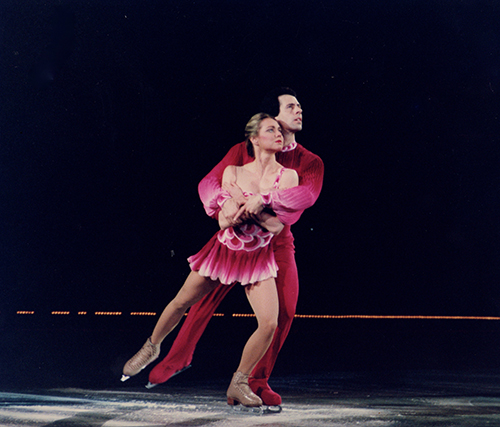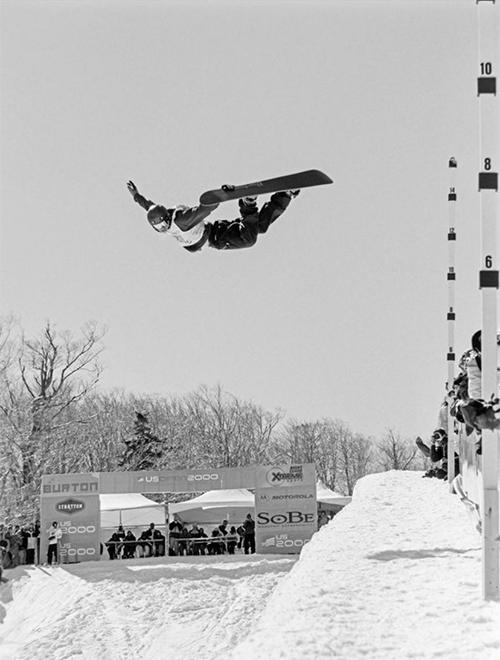As streaming video has allowed us to watch content anytime, this year’s winter Olympic Games in Beijing may be one of the “most-viewed video events in U.S. history,” according to The Washington Post.
We’re witnessing incredible athleticism, sportsmanship, and the personal narratives of what it takes to become a world-class champion. The competitions, either leading up to the Olympics or the Games themselves, can bring communities and nations together.
At Grace Farms, we have two world champions, one a former Olympian and medal winner, Lea Ann Miller, Brand and Community Project Manager, and World Champion Snowboarder Adam Petraska, Assistant Director of Facilities. In this Q&A, they talk about the mindset of an elite athlete, and how they apply this mindset to their lives today. With skating partner William Fauver, Lea Ann, is a three-time (1981, 1983–1984) U.S. Silver Medalist and 1982 U.S. Bronze Medalist. She also represented the U.S. in the 1984 Winter Olympic Game with her skating partner.
Adam won the Junior World Championships (1998 and 1999), along with the 2001 U.S. National Championships for the Halfpipe division in snowboarding.
Lea Ann Miller, Brand and Community Project Manager
Q: Of the many sports you competed in, why skating?
Lea Ann: When I was nine, we lived near a park with an outdoor rink; I skated with the girl scouts and then a coach talked to my parents about sending me to a skating summer camp. After that summer I was fully hooked and ended up in Colorado Springs through high school!
Q: What kind of mindset did you need to become an Olympic athlete?

Lea Ann Miller with her skating partner William Fauver. Courtesy Lea Ann Miller
Lea Ann: I never questioned what or why I was skating. There were hard days, and many injuries, but I always had the mindset that I would be an Olympic skater. The goal was set, and even a broken back in 1980 did not stop me from going for the next Olympics in 1984.
Q: While suffering a broken back was a terrible setback, how can we use these setbacks like your injury and go onto achieve excellence?
Lea Ann: When we didn’t make the 1980 team many sponsors, officials, judges, and even coaches, gave up on me. But I knew I was not giving up, so I moved coaches, training rinks, and anyone who was not positive or did not believe I could do it. Then as I was training, I had all those naysayers to motivate me to prove them wrong! Funny, going into a big lift or jump I would say, “This is for______” and up in the air I flew!
Q: What are the takeaways or lessons you learned as an Olympian?
Lea Ann: I was so inspired by not only my team mates, but others I met at the Olympics. Olympic Down Hill skiers Phil and Steve Mahre (Gold and Silver medalist in 1984) heard that I broke my back in 1980 (Oh, yeah, I forgot to say it was not skating, but snow skiing that I did that!) and when I was done competing, they took me to the ski slope with a new pair of Elan skis from their sponsors. And I skied down the Olympic course! I learned never to give up and surround myself with like-minded people.
Q: What was your most memorable experience at the Olympics?
Lea Ann: Without a doubt the Opening ceremonies. Walking into the arena, that is when it hit me, OMG I made the Olympics! My grandfather was my biggest supporter and a very calm person. He went to all my competitions (We played Gin Rummy to calm me down, but I of course had to win the last game before going to compete … most athletes are superstitious and competitive). We got him a bright red jacket to wear in Sarajevo so we could find him and when I walked into the huge Olympic stadium out of thousands, I saw him! It was a moment and my parents have the photo. So special to be able to share that with my whole family, who all came to cheer us on.
Q: Excellence is one of Grace Farms‘ value and naturally being an Olympian calls for excellence. What do you think the building block are to achieving excellence?
Lea Ann: Practice. Nothing happens without good-old fashioned sweat and repetition. I also think finding something that you love makes a huge difference in your achieving excellence. Passion, desire, and pride were my building blocks.
Adam Petraska, Assistant Director of Facilities
Q: How did you get started snowboarding?
Adam: I was born in Vermont into a family of skiers and started skiing at age two. I decided to switch sports when I got a snowboard for my tenth Christmas. I got hooked and my parents decided to enroll me at Okemo Mountain School so I could keep up with school, alongside a difficult training schedule. I spent hours a day on the slopes and had tutors for every class. The days were long, but worth it. They got me on a path that eventually landed me on the Burton snowboarding team alongside Shaun White, and on to win two World Championships and five National Championships throughout my career.

Snowboarding champion Adam Petraska at the 2000 U.S Open. @ Gary Land
Q: As you look back, what stands out for you during your competitions?
Adam: Snowboarding was still gaining recognition in the world when I was competing seriously. I was one of the first snowboarders to have the opportunity to try out for the U.S. Olympic team when snowboarding first became an event in 1998 in Nagano, Japan, and in 2002, Park City, Utah. That was a tough road, though, because it took a few Olympics Games before snowboarding became an event people were interested in following and watching. It’s crazy to have been at the forefront of that, and to see where snowboarding is now—especially after seeing the United States do so well at future Olympics, with such a wide range of ages and people dominating the sport.
Q: How has snowboarding changed since you were competing?
Adam: Snowboarding ranks among the highest watched of any televised sport today and is becoming more and more of a family sport, as I see it. A lot of people I competed against are now coaches, probably coaching kids who could go to the next Olympics. I think you’re more likely to see families together on the mountain today then you were back then.
Q: Do you still snowboard?
Adam: Oh absolutely. We take our kids Ainsley, 7, and Grayson, 9 snowboarding as much as we can. Grayson even builds his own jumps in the back yard. It’s so incredible to watch. Both my children are both National Champions.
And I actually met my wife, Ashley, one winter while she was visiting Okemo for a snowboarding trip with friends—so we have a lot to owe to the sport.
Q: What surprised you most about the snowboarding event during this Olympics?
Adam: How incredibly main stream Snowboarding has become as a sport in general.
At the first 1998 Olympics snowboarding was barely even televised and not really promoted as a sport, and now, you hear people at your local diner or supermarket talking about it. They might say how they think the judges made a mistake, or how high in the air a favorite athlete might have been.
The sport has evolved so much since I started. It’s now become a family tradition and that will always be part of who I am.
Q: What kind of mindset did you need to become a top or Olympic athlete?
Adam: To be an Olympian today takes more than most can imagine. The field of competition in any field is so tremendous. Train, Eat, Train … Train some more … Sleep. Repeat! The mindset is different for everyone. However, to be on top of any sport these days you have to be 100% committed and willing to give up anything and everything to win at something you truly love.
Q: Excellence is one of Grace Farms ‘value, and naturally being a top athlete calls for excellence. What do you think the building block are to achieving excellence?
Adam: Willingness to commit to something you love and to strive for excellence. As I mentioned, it’s training, training, training, and repeat. It all adds up to excellence.

